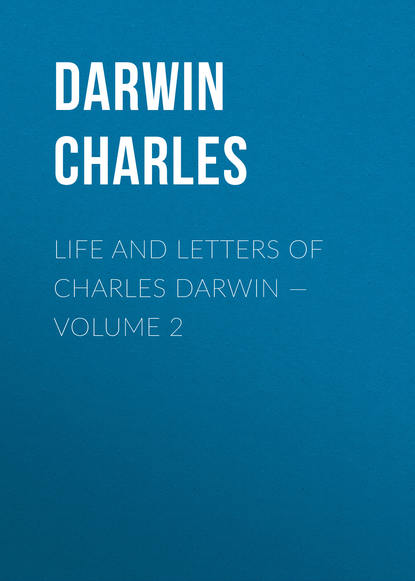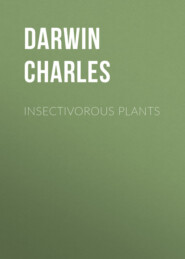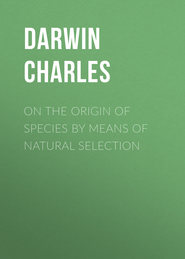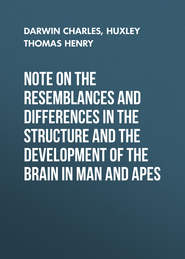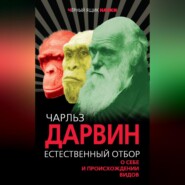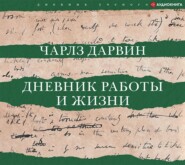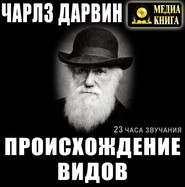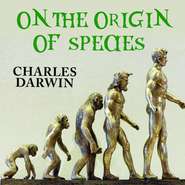По всем вопросам обращайтесь на: info@litportal.ru
(©) 2003-2024.
✖
Life and Letters of Charles Darwin — Volume 2
Настройки чтения
Размер шрифта
Высота строк
Поля
I have lately been corresponding with Lyell, who, I think, adopts your idea of the stream of variation having been led or designed. I have asked him (and he says he will hereafter reflect and answer me) whether he believes that the shape of my nose was designed. If he does I have nothing more to say. If not, seeing what Fanciers have done by selecting individual differences in the nasal bones of pigeons, I must think that it is illogical to suppose that the variations, which natural selection preserves for the good of any being have been designed. But I know that I am in the same sort of muddle (as I have said before) as all the world seems to be in with respect to free will, yet with everything supposed to have been foreseen or pre-ordained.
Farewell, my dear Gray, with many thanks for your interesting letter.
Your unmerciful correspondent. C. DARWIN.
CHARLES DARWIN TO H.W. BATES. Down, December 3 [1861].
My dear Sir,
I thank you for your extremely interesting letter, and valuable references, though God knows when I shall come again to this part of my subject. One cannot of course judge of style when one merely hears a paper (On Mimetic Butterflies, read before the Linnean Soc., November 21, 1861. For my father's opinion of it when published, see below.), but yours seemed to me very clear and good. Believe me that I estimate its value most highly. Under a general point of view, I am quite convinced (Hooker and Huxley took the same view some months ago) that a philosophic view of nature can solely be driven into naturalists by treating special subjects as you have done. Under a special point of view, I think you have solved one of the most perplexing problems which could be given to solve. I am glad to hear from Hooker that the Linnean Society will give plates if you can get drawings...
Do not complain of want of advice during your travels; I dare say part of your great originality of views may be due to the necessity of sel-exertion of thought. I can understand that your reception at the British Museum would damp you; they are a very good set of men, but not the sort to appreciate your work. In fact I have long thought that TOO MUCH systematic work [and] description somehow blunts the faculties. The general public appreciates a good dose of reasoning, or generalisation, with new and curious remarks on habits, final causes, etc. etc., far more than do the regular naturalists.
I am extremely glad to hear that you have begun your travels... I am very busy, but I shall be TRULY glad to render any aid which I can by reading your first chapter or two. I do not think I shall be able to correct style, for this reason, that after repeated trials I find I cannot correct my own style till I see the MS. in type. Some are born with a power of good writing, like Wallace; others like myself and Lyell have to labour very hard and slowly at every sentence. I find it a very good plan, when I cannot get a difficult discussion to please me, to fancy that some one comes into the room and asks me what I am doing; and then try at once and explain to the imaginary person what it is all about. I have done this for one paragraph to myself several times, and sometimes to Mrs. Darwin, till I see how the subject ought to go. It is, I think, good to read one's MS. aloud. But style to me is a great difficulty; yet some good judges think I have succeeded, and I say this to encourage you.
What I THINK I can do will be to tell you whether parts had better be shortened. It is good, I think, to dash "in media res," and work in later any descriptions of country or any historical details which may be necessary. Murray likes lots of wood-cuts — give some by all means of ants. The public appreciate monkeys — our poor cousins. What sexual differences are there in monkeys? Have you kept them tame? if so, about their expression. I fear that you will hardly read my vile hand-writing, but I cannot without killing trouble write better.
You shall have my candid opinion on your MS., but remember it is hard to judge from MS., one reads slowly, and heavy parts seem much heavier. A first-rate judge thought my Journal very poor; now that it is in print, I happen to know, he likes it. I am sure you will understand why I am so egotistical.
I was a LITTLE disappointed in Wallace's book ('Travels on the Amazon and Rio Negro,' 1853.) on the Amazon; hardly facts enough. On the other hand, in Gosse's book (Probably the 'Naturalist's Sojourn in Jamaica,' 1851.) there is not reasoning enough to my taste. Heaven knows whether you will care to read all this scribbling...
I am glad you had a pleasant day with Hooker (In a letter to Sir J.D. Hooker (December 1861), my father wrote: "I am very glad to hear that you like Bates. I have seldom in my life been more struck with a man's power of mind."), he is an admirably good man in every sense.
[The following extract from a letter to Mr. Bates on the same subject is interesting as giving an idea of the plan followed by my father in writing his 'Naturalist's Voyage:'
"As an old hackneyed author, let me give you a bit of advice, viz. to strike out every word which is not quite necessary to the current subject, and which could not interest a stranger. I constantly asked myself, would a stranger care for this? and struck out or left in accordingly. I think too much pains cannot be taken in making the style transparently clear and throwing eloquence to the dogs."
Mr. Bates's book, 'The Naturalist on the Amazons,' was published in 1865, but the following letter may be given here rather than in its due chronological position:]
CHARLES DARWIN TO H.W. BATES. Down, April 18, 1863.
Dear Bates,
I have finished volume i. My criticisms may be condensed into a single sentence, namely, that it is the best work of Natural History Travels ever published in England. Your style seems to me admirable. Nothing can be better than the discussion on the struggle for existence, and nothing better than the description of the Forest scenery. (In a letter to Lyell my father wrote: "He [i.e. Mr. Bates] is second only to Humboldt in describing a tropical forest.") It is a grand book, and whether or not it sells quickly, it will last. You have spoken out boldly on Species; and boldness on the subject seems to get rarer and rarer. How beautifully illustrated it is. The cut on the back is most tasteful. I heartily congratulate you on its publication.
The "Athenaeum" ("I have read the first volume of Bates's Book; it is capital, and I think the best Natural History Travels ever published in England. He is bold about Species, etc., and the "Athenaeum" coolly says 'he bends his facts' for this purpose." — (From a letter to Sir J.D. Hooker.)) was rather cold, as it always is, and insolent in the highest degree about your leading facts. Have you seen the "Reader"? I can send it to you if you have not seen it...
CHARLES DARWIN TO ASA GRAY. Down, December 11 [1861].
My dear Gray,
Many and cordial thanks for your two last most valuable notes. What a thing it is that when you receive this we may be at war, and we two be bound, as good patriots, to hate each other, though I shall find this hating you very hard work. How curious it is to see two countries, just like two angry and silly men, taking so opposite a view of the same transaction! I fear there is no shadow of doubt we shall fight if the two Southern rogues are not given up. (The Confederate Commissioners Slidell and Mason were forcibly removed from the "Trent", a West India mail steamer on November 8, 1861. The news that the U.S. agreed to release them reached England on January 8, 1862.) And what a wretched thing it will be if we fight on the side of slavery. No doubt it will be said that we fight to get cotton; but I fully believe that this has not entered into the motive in the least. Well, thank Heaven, we private individuals have nothing to do with so awful a responsibility. Again, how curious it is that you seem to think that you can conquer the South; and I never meet a soul, even those who would most wish it, who thinks it possible — that is, to conquer and retain it. I do not suppose the mass of people in your country will believe it, but I feel sure if we do go to war it will be with the utmost reluctance by all classes, Ministers of Government and all. Time will show, and it is no use writing or thinking about it. I called the other day on Dr. Boott, and was pleased to find him pretty well and cheerful. I see, by the way, he takes quite an English opinion of American affairs, though an American in heart. (Dr. Boott was born in the U.S.) Buckle might write a chapter on opinion being entirely dependent on longitude!
... With respect to Design, I feel more inclined to show a white flag than to fire my usual long-range shot. I like to try and ask you a puzzling question, but when you return the compliment I have great doubts whether it is a fair way of arguing. If anything is designed, certainly man must be: one's "inner consciousness" (though a false guide) tells one so; yet I cannot admit that man's rudimentary mammae... were designed. If I was to say I believed this, I should believe it in the same incredible manner as the orthodox believe the Trinity in Unity. You say that you are in a haze; I am in thick mud; the orthodox would say in fetid, abominable mud; yet I cannot keep out of the question. My dear Gray, I have written a deal of nonsense.
Yours most cordially, C. DARWIN.
1862.
[Owing to the illness from scarlet fever of one of his boys, he took a house at Bournemouth in the autumn. He wrote to Dr. Gray from Southampton (August 21, 1862): —
"We are a wretched family, and ought to be exterminated. We slept here to rest our poor boy on his journey to Bournemouth, and my poor dear wife sickened with scarlet fever, and has had it pretty sharply, but is recovering well. There is no end of trouble in this weary world. I shall not feel safe till we are all at home together, and when that will be I know not. But it is foolish complaining."
Dr. Gray used to send postage stamps to the scarlet fever patient; with regard to this good-natured deed my father wrote —
"I must just recur to stamps; my little man has calculated that he will now have 6 stamps which no other boy in the school has. Here is a triumph. Your last letter was plaistered with many coloured stamps, and he long surveyed the envelope in bed with much quiet satisfaction."
The greater number of the letters of 1862 deal with the Orchid work, but the wave of conversion to Evolution was still spreading, and reviews and letters bearing on the subject still came in numbers. As an example of the odd letters he received may be mentioned one which arrived in January of this year "from a German homoeopathic doctor, an ardent admirer of the 'Origin.' Had himself published nearly the same sort of book, but goes much deeper. Explains the origin of plants and animals on the principles of homoeopathy or by the law of spirality. Book fell dead in Germany. Therefore would I translate it and publish it in England."]
CHARLES DARWIN TO T.H. HUXLEY. Down, [January?] 14 [1862].
My dear Huxley,
I am heartily glad of your success in the North (This refers to two of Mr. Huxley's lectures, given before the Philosophical Institution of Edinburgh in 1862. The substance of them is given in 'Man's Place in Nature.'), and thank you for your note and slip. By Jove you have attacked Bigotry in its stronghold. I thought you would have been mobbed. I am so glad that you will publish your Lectures. You seem to have kept a due medium between extreme boldness and caution. I am heartily glad that all went off so well. I hope Mrs. Huxley is pretty well... I must say one word on the Hybrid question. No doubt you are right that here is a great hiatus in the argument; yet I think you overrate it — you never allude to the excellent evidence of VARIETIES of Verbascum and Nicotiana being partially sterile together. It is curious to me to read (as I have to-day) the greatest crossing GARDENER utterly pooh-poohing the distinction which BOTANISTS make on this head, and insisting how frequently crossed VARIETIES produce sterile offspring. Do oblige me by reading the latter half of my Primula paper in the 'Linn. Journal,' for it leads me to suspect that sterility will hereafter have to be largely viewed as an acquired or SELECTED character — a view which I wish I had had facts to maintain in the 'Origin.' (The view here given will be discussed in the chapter on hetero-styled plants.)
CHARLES DARWIN TO J.D. HOOKER. Down, January 25 [1862].
My dear Hooker,
Many thanks for your last Sunday's letter, which was one of the pleasantest I ever received in my life. We are all pretty well redivivus, and I am at work again. I thought it best to make a clean breast to Asa Gray; and told him that the Boston dinner, etc. etc., had quite turned my stomach, and that I almost thought it would be good for the peace of the world if the United States were split up; on the other hand, I said that I groaned to think of the slave-holders being triumphant, and that the difficulties of making a line of separation were fearful. I wonder what he will say... Your notion of the Aristocrat being kenspeckle, and the best men of a good lot being thus easily selected is new to me, and striking. The 'Origin' having made you in fact a jolly old Tory, made us all laugh heartily. I have sometimes speculated on this subject; primogeniture (My father had a strong feeling as to the injustice of primogeniture, and in a similar spirit was often indignant over the unfair wills that appear from time to time. He would declare energetically that if he were law-giver no will should be valid that was not published in the testator's lifetime; and this he maintained would prevent much of the monstrous injustice and meanness apparent in so many wills.) is dreadfully opposed to selection; suppose the first-born bull was necessarily made by each farmer the begetter of his stock! On the other hand, as you say, ablest men are continually raised to the peerage, and get crossed with the older Lord-breeds, and the Lords continually select the most beautiful and charming women out of the lower ranks; so that a good deal of indirect selection improves the Lords. Certainly I agree with you the present American row has a very Torifying influence on us all. I am very glad to hear you are beginning to print the 'Genera;' it is a wonderful satisfaction to be thus brought to bed, indeed it is one's chief satisfaction, I think, though one knows that another bantling will soon be developing...
CHARLES DARWIN TO MAXWELL MASTERS. (Dr. Masters is a well-known vegetable teratologist, and has been for many years the editor of the "Gardeners' Chronicle".) Down, February 26 [1862].
My dear Sir,
I am much obliged to you for sending me your article (Refers to a paper on "Vegetable Morphology," by Dr. Masters, in the 'British and Foreign Medic-Chirurgical Review' for 1862), which I have just read with much interest. The history, and a good deal besides, was quite new to me. It seems to me capitally done, and so clearly written. You really ought to write your larger work. You speak too generously of my book; but I must confess that you have pleased me not a little; for no one, as far as I know, has ever remarked on what I say on classification — a part, which when I wrote it, pleased me. With many thanks to you for sending me your article, pray believe me,
My dear Sir, yours sincerely, C. DARWIN.
[In the spring of this year (1862) my father read the second volume of Buckle's 'History of Civilisation." The following strongly expressed opinion about it may be worth quoting: —
"Have you read Buckle's second volume? It has interested me greatly; I do not care whether his views are right or wrong, but I should think they contained much truth. There is a noble love of advancement and truth throughout; and to my taste he is the very best writer of the English language that ever lived, let the other be who he may."]
CHARLES DARWIN TO ASA GRAY. Down, March 15 [1862].
My dear Gray,
Thanks for the newspapers (though they did contain digs at England), and for your note of February 18th. It is really almost a pleasure to receive stabs from so smooth, polished, and sharp a dagger as your pen. I heartily wish I could sympathise more fully with you, instead of merely hating the South. We cannot enter into your feelings; if Scotland were to rebel, I presume we should be very wrath, but I do not think we should care a penny what other nations thought. The millennium must come before nations love each other; but try and do not hate me. Think of me, if you will as a poor blinded fool. I fear the dreadful state of affairs must dull your interest in Science...
I believe that your pamphlet has done my book GREAT good; and I thank you from my heart for myself; and believing that the views are in large part true, I must think that you have done natural science a good turn. Natural Selection seems to be making a little progress in England and on the Continent; a new German edition is called for, and a French (In June, 1862, my father wrote to Dr. Gray: "I received, 2 or 3 days ago, a French translation of the 'Origin,' by a Madlle. Royer, who must be one of the cleverest and oddest women in Europe: is an ardent Deist, and hates Christianity, and declares that natural selection and the struggle for life will explain all morality, nature of man, politics, etc. etc.! She makes some very curious and good hits, and says she shall publish a book on these subjects." Madlle. Royer added foot-notes to her translation, and in many places where the author expresses great doubt, she explains the difficulty, or points out that no real difficulty exists.) one has just appeared. One of the best men, though at present unknown, who has taken up these views, is Mr. Bates; pray read his 'Travels in Amazonia,' when they appear; they will be very good, judging from MS. of the first two chapters.
... Again I say, do not hate me.
Ever yours most truly, C. DARWIN.
CHARLES DARWIN TO C. LYELL. 1 Carlton Terrace, Southampton (The house of his son William.), August 22, [1862].
... I heartily hope that you (I.e. 'The Antiquity of Man.') will be out in October... you say that the Bishop and Owen will be down on you; the latter hardly can, for I was assured that Owen in his Lectures this spring advanced as a new idea that wingless birds had lost their wings by disuse, also that magpies stole spoons, etc., from a REMNANT of some instinct like that of the Bower-Bird, which ornaments its playing-passage with pretty feathers. Indeed, I am told that he hinted plainly that all birds are descended from one...





